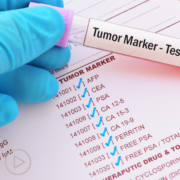Tag Archive for: Engage Prostate Cancer
COVID Vaccines: What Do Prostate Cancer Patients Need to Know?
COVID Vaccines: What Do Prostate Cancer Patients Need to Know? from Patient Empowerment Network on Vimeo.
What do prostate cancer patients need to know about COVID-19 vaccines? Dr. Himisha Beltran shares information about safety, effectiveness, and recommendations for prostate cancer patients in active treatment.
Dr. Himisha Beltran is Director of Translational Research in the Department of Medical Oncology at Dana-Farber Cancer Institute. Learn more about Dr. Beltran, here.
See More From Engage Prostate Cancer
Related Resources

|

|

|
Transcript:
Katherine:
Is the COVID vaccine safe and effective for patients with prostate cancer?
Dr. Beltran:
Absolutely. There really are no contraindications to getting the COIVD vaccine, unless there is some component of the vaccine that a patient cannot tolerate. And prostate cancer patients tend to be older. They can have their lower immune system if they’re getting chemotherapy. So, they’re at higher risk for having complications from COVID itself. So, I do think that it’s something to consider. There are even patients that are undergoing active therapy. They should, I think, consider getting the vaccine.
Katherine:
How does the vaccine effect treatment?
Dr. Beltran:
There should not be any delays or changes in therapy based on getting the vaccine.
An Update on Prostate Cancer Treatment and Research
An Update on Prostate Cancer Treatment and Research from Patient Empowerment Network on Vimeo.
What’s the latest in prostate cancer treatment and research? Dr. Himisha Beltran shares developments in precision medicine and clinical trials, including how prostate-specific membrane antigen (PSMA) imaging can help provide targeted care.
Dr. Himisha Beltran is Director of Translational Research in the Department of Medical Oncology at Dana-Farber Cancer Institute. Learn more about Dr. Beltran, here.
See More From Engage Prostate Cancer
Related Resources

|

COVID Vaccines: What Do Prostate Cancer Patients Need to Know? |

|
Transcript:
Katherine:
Dr. Beltran, when it comes to prostate cancer research and emerging treatment options, what are you excited about specifically?
Dr. Beltran:
Well, there’s so much I’m excited about. There’s a lot happening in prostate cancer research. When it comes to precision medicine, we are still at the beginning. We are developing new trials and treatment strategies to target other mutations with drugs that have not yet been approved. We have the capability to interrogate treatment resistance, recognizing that tumors can evolve, and the technologies are such where we can start to understand why different people respond differently to the different treatments that we have, and now come in to try to prevent of bypass that treatment-resistant pathway, which is still a very new field.
I’m also very excited about even our understanding about the inherited mutations that predispose to prostate cancer because that has implications for family members, and one could envision a future where we have better detection and prevention for prostate cancer for high-risk individuals. And then, finally, one class of drugs that we didn’t talk about that is really precision medicine’s strategy is a class of drugs targeting PSMA – prostate-specific membrane antigen.
So, that is a molecular feature of the cancer. It is a protein that is expressed on the cell surface of prostate cancer. It’s not a genetic mutation that we test through genetic sequencing, but we have something called PSMA imaging where we can do molecular imaging to figure out if the prostate cancer expresses this protein. And there are a number of drug approaches that are coming in to target this very specific protein on the cell surface.
And so, I’m very excited about that. I do think that does represent precision medicine, and these are treatments in clinical trials that we’ll hear much more about later this year. And so, I think in general, as we start thinking about how we start treating prostate cancers, we’re moving beyond, “Treat everyone the same,” and really trying to figure out, “Can we really understand, who are the patients? And develop strategies that are more specific for that individual.”
How to Engage in Your Prostate Cancer Treatment Decisions
How to Engage in Your Prostate Cancer Treatment Decisions from Patient Empowerment Network on Vimeo.
What factors are important to consider when deciding on a prostate cancer treatment approach? Dr. Himisha Beltran reviews key considerations and highlights the important role patients play in their care.
Dr. Himisha Beltran is Director of Translational Research in the Department of Medical Oncology at Dana-Farber Cancer Institute. Learn more about Dr. Beltran, here.
See More From Engage Prostate Cancer
Related Resources

|

COVID Vaccines: What Do Prostate Cancer Patients Need to Know? |

How Do Genetic Mutations Impact Prostate Cancer Treatment Options? |
Transcript:
Katherine:
What are the considerations when choosing treatment for prostate cancer?
Dr. Beltran:
Yeah, so there are many considerations when thinking about a therapy choice for a patient with prostate cancer. Oftentimes, we use clinical features, radiology, blood tests, and now molecular features incorporating into that to really guide care based on how indolent or aggressive the cancer is. There are some cancers that don’t need to be treated that we follow on active surveillance. There are different states where we may do intermittent treatment, weighing the risks and benefits of the therapy.
And then, in the more advanced setting where you need continuous treatment – and there is now many choices of different drugs that are approved for prostate cancer – we often make these choices with our patients based on not just the trajectory of the cancer but also weighing the side effects and quality of life and other issues for those different treatment modalities. And I see precision medicine as providing one extra layer of information to help guide those conversations.
Katherine:
What’s the patient’s role in making treatment decisions?
Dr. Beltran:
The patient is the center. It’s really our role to help inform and partner with them because now we have a lot of choice. And one choice might not be the same for each individual. And so, we use clinical features and features of the cancer, but the other features factor, such as quality of life. It factors cost considerations – the logistics of it all. These can vary across the different treatments. And so, it really requires really going through everything with the patient. And the patient really does have a voice and really should be the center of that treatment decision.
Prostate cancer treatment is complex, and sometimes there are questions there are questions that a patient might have that their physician did not answer adequately. And they really should speak up because it’s important to know what all the options are. There are even things like the DNA sequencing. It can be difficult to interpret. And you may not know what available treatments are there unless you ask the questions.



